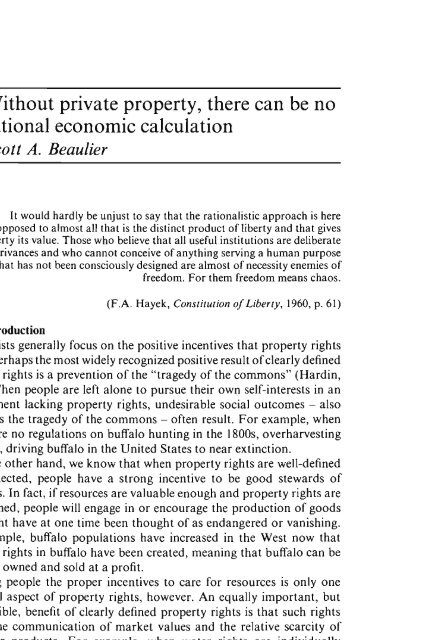Handbook on Contemporary Austrian Economics
Handbook on Contemporary Austrian Economics
Handbook on Contemporary Austrian Economics
Create successful ePaper yourself
Turn your PDF publications into a flip-book with our unique Google optimized e-Paper software.
6 Without private property, there can be no<br />
rati<strong>on</strong>al ec<strong>on</strong>omic calculati<strong>on</strong><br />
Scott A. Beaulier<br />
It would hardly be unjust to say that the rati<strong>on</strong>alistic approach is here<br />
opposed to almost all that is the distinct product of liberty and that gives<br />
liberty its value. Those who believe that all useful instituti<strong>on</strong>s are deliberate<br />
c<strong>on</strong>trivances and who cannot c<strong>on</strong>ceive of anything serving a human purpose<br />
that has not been c<strong>on</strong>sciously designed are almost of necessity enemies of<br />
freedom. For them freedom means chaos.<br />
(F.A. Hayek, C<strong>on</strong>stituti<strong>on</strong> of Liberty, 1960, p. 61)<br />
6.1 Introducti<strong>on</strong><br />
Ec<strong>on</strong>omists generally focus <strong>on</strong> the positive incentives that property rights<br />
create. Perhaps the most widely recognized positive result of clearly defined<br />
property rights is a preventi<strong>on</strong> of the "tragedy of the comm<strong>on</strong>s" (Hardin,<br />
1968). When people are left al<strong>on</strong>e to pursue their own self-interests in an<br />
envir<strong>on</strong>ment lacking property rights, undesirable social outcomes - also<br />
known as the tragedy of the comm<strong>on</strong>s - often result. For example, when<br />
there were no regulati<strong>on</strong>s <strong>on</strong> buffalo hunting in the 1800s, overharvesting<br />
occurred, driving buffalo in the United States to near extincti<strong>on</strong>.<br />
On the other hand, we know that when property rights are well-defined<br />
and protected, people have a str<strong>on</strong>g incentive to be good stewards of<br />
resources. In fact, if resources are valuable enough and property rights are<br />
well-defined, people will engage in or encourage the producti<strong>on</strong> of goods<br />
that might have at <strong>on</strong>e time been thought of as endangered or vanishing.<br />
For example, buffalo populati<strong>on</strong>s have increased in the West now that<br />
property rights in buffalo have been created, meaning that buffalo can be<br />
privately owned and sold at a profit.<br />
Giving people the proper incentives to care for resources is <strong>on</strong>ly <strong>on</strong>e<br />
beneficial aspect of property rights, however. An equally important, but<br />
less tangible, benefit of clearly defined property rights is that such rights<br />
enable the communicati<strong>on</strong> of market values and the relative scarcity of<br />
particular products. For example, when water rights are individually<br />
owned, and individuals must buy their water from private owners, the<br />
price of the water reflects the true scarcity and value of the resource. By<br />
c<strong>on</strong>trast, this informati<strong>on</strong> is often obscured by government subsidies and

















